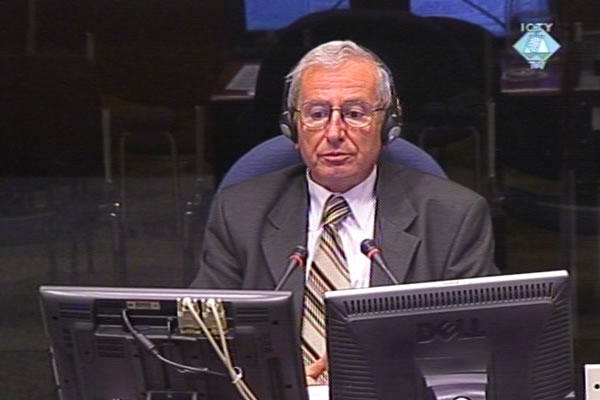Home
POSSIBLE IN PRACTICE BUT NOT UNDER LAW
Prosecution witness Miodrag Starcevic contends that there ‘is no legal basis’ on which the VJ may staff military units of other countries. Also, according to Starcevic, the VJ cannot grant rights formulated in line with military regulations of other countries
 Miodrag Starčević, svjedok na suđenju Momčilu Perišiću
Miodrag Starčević, svjedok na suđenju Momčilu Perišiću In his testimony at the trial of General Momcilo Perisic, former chief of the legal department in the VJ General Staff Miodrag Starcevic noted that there ‘is no legal basis’ for the Yugoslav officers to be assigned to military units of some other country. In Starcevic’s words, the request the SVK Main Staff sent to the VJ General Staff to transfer specific officers to its aviation units was ‘rather unusual’.
General Perisic is allegedly responsible, as the chief of the General Staff, for the establishment and organization of the 30th and the 40 Personnel Centers which transferred the VJ soldiers to the VRS in BH and the SVK in Croatia. Starcevic is testifying about the legislation related to the establishment and operation of those centers.
The prosecution showed Starcevic a series of documents on the hardship allowance. Among the documents that Starcevic analyzed is a decision of the former chief of the General Staff Momcilo Perisic defining the missions and territory where hardship allowance applied, and a decision of the VRS Main Staff commander Ratko Mladic determining the amounts to be paid to VJ personnel seconded to the VRS, and a general decision of the 30th Personnel Center referring to Mladic’s decision granting the hardship allowance to specific individuals.
Starcevic said today that, pursuant to the rules on the implementation of international law of war in the FRY armed forces, a superior officer ‘was obliged to initiate the proceedings before the military prosecution and prevent further violations of international law of war as soon as he learned that any of his subordinates perpetrated crimes’. As the witness put it, if a superior officer didn’t institute proceedings to establish the responsibility he would have to be held responsible himself as a co-perpetrator or instigator.
The prosecution contends that General Perisic had the ‘authority, responsibility and actual ability to implement disciplinary mechanisms’ to prevent and punish crimes perpetrated by his subordinates who were sent through the 30th and 40th Personnel Centers to BH and Croatia. Instead, the indictment alleges, Perisic promoted many officers of the SVK and the RSK to higher ranks after the crimes they had committed became known. The promotion was denied only to General Milan Celeketic but it was only because Perisic held Celeketic responsible of losing ‘the Serb territories’ in Western Slavonia and not because Celeketic ordered the shelling of Zagreb in May 1995.
Miodrag Starcevic will continue his evidence in May; on Monday the prosecution will call its next witness.
Linked Reports
- Case : Perisic
- 2009-04-22 MILITARY GUEST WORKERS
- 2009-03-23 GENERAL MLADIC’S BELGRADE CONNECTIONS
- 2009-03-02 FUGITIVE FROM TRIBUNAL SHELTERED IN SERBIAN MILITARY RESORT
- 2009-05-07 SERVICE IN A FOREIGN ARMY
- 2009-05-20 UNPROFOR: SHIELD OR HOSTAGE
- 2009-05-21 DIFFERENCE BETWEEN DIPLOMACY AND SITUATION IN THE FIELD
